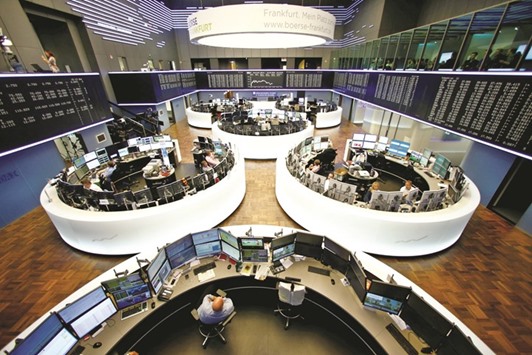World stock markets headed south yesterday as new polls showed a rise in support for Brexit, adding to concerns over the economic outlook.
Investors rushed for haven investments like the yen and gold, seeking financial protection in case Britons vote to leave the European Union in a June 23 referendum.
Europe’s main stock markets ended down between 0.3 and 0.6% after two new polls showed support for Brexit ahead of the pro-EU camp just one week before the tightly fought vote.
London’s FTSE 100 was down 0.3% at 5,950.48 points, Frankfurt’s DAX 30 was down 0.6% at 9,550.47 and Paris’ CAC 40 was down 0.5% at 4,153.01 at close. The EURO STOXX 50 ended the day down 0.6% at 2,812.97 points.
US stocks also pushed lower yesterday, with the Dow shedding 0.4% in late morning trading.
Gold meanwhile hit a near two-year high.
The Fed on Wednesday lowered its growth forecasts for this year and the following two, and flagged interest rates rises to be lower and slower, highlighting growing concern about the US and wider global economic outlook.
Yesterday also saw the Bank of England leave its main interest rate at 0.5%, while the BoE maintained the amount of its cash stimulus pumping around the economy.
“The outcome of the referendum continues to be the largest immediate risk facing UK financial markets, and possibly also global financial markets,” read minutes from the BoE’s June meeting, which added that “were the UK to vote to leave the EU, sterling’s exchange rate would fall further, perhaps sharply”.
In a news conference after the Federal Reserve kept interest rates unchanged, Fed chair Janet Yellen voiced confidence in the US economy but said there were concerns about the impact a British exit from the EU would have across the world.
The news put downward pressure on the dollar versus the yen, and that was compounded Thursday when Japan’s central bank held off boosting its stimulus programme, despite stuttering economic growth at home and uncertainty overseas.
The dollar fell to 103.55 yen after the BoJ wrapped up its two-day policy meeting - its lowest since August 2014.
The euro fell to 116.92 yen, a three-and-a-half-year low.
That hammered Japan’s exporters, sending the Nikkei stock index diving more than 3%.
The dollar rebounded in European trading hours and was up sharply against the pound, while investors seeking safety continued to throw money at other haven assets such as German government bonds and gold.
The precious metal hit $1,315.71 an ounce yesterday — the highest level since August 2014.

A general view of the Frankfurt Stock Exchange yesterday. Frankfurt’s DAX 30 was down 0.6% at 9,550.47 points at close.
